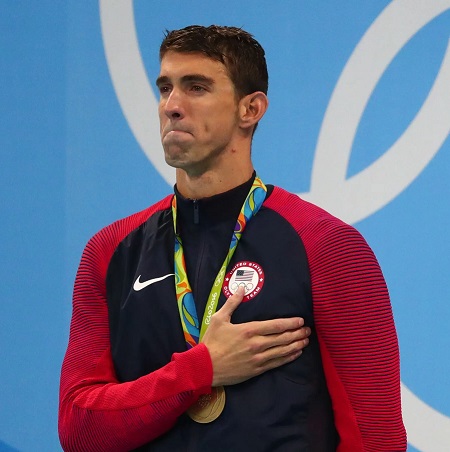The Olympic Games stand as the pinnacle of global sports competition, one athlete has etched his name in history as the most successful Olympian, boasting an incredible tally of 28 medals, including 23 gold, earned entirely on his own.
American swimmer Michael Phelps, born on June 30, 1985, in Baltimore, Maryland, grew up immersed in the world of swimming. He joined the esteemed North Baltimore Aquatic Club at just seven years old, setting the stage for an extraordinary career. Phelps ultimately etched his name in history as the athlete with the most Olympic medals ever, amassing an impressive total of 28—comprising 23 gold’s, 3 silvers, and 2 bronzes. His unforgettable performance at the 2008 Beijing Olympics saw him achieve an unprecedented feat, becoming the first athlete to secure 8 gold medals at a single Olympic Games.
Michael Phelps: The Medal Machine
At the 2000 Sydney Olympics, Michael Phelps made his mark by finishing fifth in the 200-meter butterfly. Just a year later, at the U.S. Spring Nationals, he etched his name in history as the youngest male swimmer to set a world record at only 15 years old, clocking an impressive 1:54.92 in the 200-meter butterfly. That same year, he garnered his first international title at the World Championships held in Fukuoka, Japan. In 2002, Phelps continued his ascent by winning five medals at the Pan Pacific Championships, three of which were gold. The following year, at the 2003 U.S. Spring Nationals, he became the first male swimmer to claim titles in three different strokes at one national championship. He wowed the world later by breaking five individual world records at the World Championships in Barcelona and clinching five titles at the U.S. Summer Nationals — a record for a male swimmer at a single championship.
The 2004 Athens Olympics marked a major milestone in Phelps’s career as he racked up six gold medals and two bronze, setting five Olympic and world records in the process. His remarkable achievement of four individual swimming gold’s tied the legendary Mark Spitz’s record from the 1972 Munich Olympics. In 2007, during the World Championships in Melbourne, Phelps showcased his dominance by winning seven gold medals and setting five world records, matching Spitz’s record for the most victories at a major international competition.
As he entered the 2008 Beijing Olympics, Phelps aimed to surpass Spitz’s record of seven gold’s in a single Olympic Games. He started strong, winning gold in his first three events, each time setting a new world record. On August 13, 2008, he added two more gold medals to his collection, bringing his career total to 10 and achieving a new Olympic record with 11 gold’s. Phelps then shattered his own world record in the 200-meter individual medley, claiming his sixth gold of the Beijing Games. In a nail-biting finish, he won the 100-meter butterfly final by just 0.01 seconds, equaling Spitz’s legendary record. Throughout the Beijing competition, Phelps set world records in all but one of his eight gold-medal-winning events. Following this extraordinary Olympic performance, he triumphed yet again, winning five gold’s and one silver at the 2009 World Championships in Rome.
At the 2012 London Olympics, Phelps faced an unexpected hurdle, finishing without a medal in his initial event, the 400-meter individual medley. Nevertheless, he bounced back strongly, securing two silvers and a gold in the subsequent three events. His victory earned him an unprecedented 19th Olympic medal, overtaking the previous record held by Soviet gymnast Larisa Latina. He also made history by winning gold in the 200-meter individual medley, becoming the first male swimmer to win the same event at three consecutive Olympics. Phelps then clinched the 100-meter butterfly for the third consecutive time and wrapped up his Olympic career with a gold in the 4×100 medley relay. Following the London Games, Phelps announced his retirement from competitive swimming.
Return from Retirement Michael Phelps didn’t stay retired for long, jumping back into the competitive swimming scene in April 2014. However, his comeback faced a bump when, in October of that year, USA Swimming handed him a six-month suspension after he was charged with drunk driving—this wasn’t his first encounter with the law, as he had faced a similar situation back in 2004. Despite the controversy, Phelps took on the honorable role of flag bearer for the U.S. at the opening ceremony of the 2016 Rio de Janeiro Olympics. This event marked his fifth appearance at the Games, setting a world record for American male swimmers. In Rio, he dazzled once again, adding four gold medals and one silver to his already legendary collection.
At the Rio Olympics, during what would be the final chapter of his swimming career, South Africa’s Chad le Clos stood as Michael Phelps’s most significant challenger. Their rivalry had been intense since le Clos edged past Phelps by a mere 0.05 seconds at the 2012 Olympics, sparking a fierce competition over the subsequent four years. In a memorable moment, cameras captured le Clos warming up right in front of Phelps, glaring at him—footage that quickly turned into a viral meme. However, during the race, Phelps triumphed, finishing just 0.04 seconds ahead, and his celebration in the pool was notably exuberant. This victory marked an incredible comeback, leading him to retire from competitive swimming once again.
Throughout his illustrious career, Phelps set a remarkable total of 39 world records—29 in individual events and 10 in relays—making him the most decorated swimmer recognized by FINA. Many of these records were achieved while he secured an impressive 28 Olympic medals, including 23 gold, 3 silver, and 2 bronze.
In a candid interview, Phelps opened up about a profoundly personal experience. After capturing four gold medals and two silver at the 2012 London Olympics, he found himself in a dark place, grappling with thoughts of suicide. He revealed that he locked himself away for four days, refusing to eat or drink, consumed by the idea of ending his life. Depression had gripped him so fiercely that he felt trapped in his thoughts. During this challenging period, he also faced struggles with substance abuse. It was this fight that propelled him out of retirement, as he sought to distance himself from harmful patterns and reclaim control over his life.

